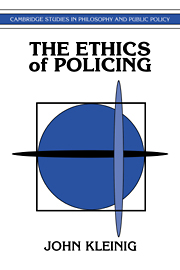Book contents
- Frontmatter
- Contents
- Preface
- 1 Introduction: ethics and police ethics
- Part I Professional ethics
- Part II Personal ethics
- 4 Institutional culture and individual character
- 5 Police discretion
- 6 The use of force
- 7 The use of deception
- 8 Entrapment
- 9 Gratuities and corruption
- 10 Public roles and private lives
- Part III Organizational ethics
- Notes
- Index of authors
- Index of subjects
9 - Gratuities and corruption
Published online by Cambridge University Press: 05 June 2012
- Frontmatter
- Contents
- Preface
- 1 Introduction: ethics and police ethics
- Part I Professional ethics
- Part II Personal ethics
- 4 Institutional culture and individual character
- 5 Police discretion
- 6 The use of force
- 7 The use of deception
- 8 Entrapment
- 9 Gratuities and corruption
- 10 Public roles and private lives
- Part III Organizational ethics
- Notes
- Index of authors
- Index of subjects
Summary
Surely shoveling society's shit is worth something.
Police officerDon't take a dim view of criminals. Remember, society's shit is your bread and butter.
Nicholas RossCorruption in police work has been a pervasive and continuing problem. Almost every serious history of policing and even of particular police departments has had to confront the issue of police corruptibility. Only the smallest and most vigilant departments have escaped its wasting effects. Corruption has been more virulent, visible and deeprooted at some times and in some jurisdictions than at other times and in other jurisdictions. Large urban departments are more prone to corruption than most, though even in small communities police may be just as deeply corrupted. When, from time to time, police corruption has been uncovered, police spokespeople have usually been quick to speak of the rotten apple in every barrel. But it is clear that the corruption has often been much more extensive, claiming not simply lower-ranked officers, or officers on patrol, but involving officers of almost every rank in a network of intrigue, or at least disregard. Indeed, corruption is as much a top-down as a bottom-up problem.
Corruption is also a serious problem in police work. This is not only because it violates the ethical norms governing that work, but also because it impairs the ability of police to carry out their work successfully. Corruption is damaging to credibility, and police work, to be effective, needs the confidence and cooperation of the citizenry.
- Type
- Chapter
- Information
- The Ethics of Policing , pp. 163 - 187Publisher: Cambridge University PressPrint publication year: 1996
- 1
- Cited by

